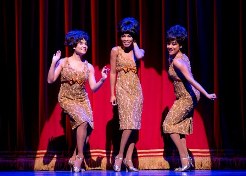Review: Motown: The Musical

It’s a good thing that Motown: The Musical has the music of Motown to depend on. This self-serving musical documenting the rise and fall of the legendary Detroit music label was written by its founder, Berry Gordy, and it doesn’t exactly dig very deep. But it doesn’t really have to—not when it can deliver over fifty classics from an catalogue made famous by the likes of Diana Ross and the Supremes, the Jackson Five, the Four Tops, the Temptations, Marvin Gaye, Smokey Robinson and many, many others. Even before its opening, the show seems to have solidly established its hit status.
Basing the book on his autobiography—David Goldsmith and Dick Scanlan are listed far down in the credits as “Script Consultants”—Gordy delivers a portrait of Motown as a scrappy upstart label that revolutionized the music industry with its roster of amazing talents. That is, until it fell victim to the corporate behemoths that purloined his unfaithful artists by offering them barrels of money.
The show’s storyline begins and ends on the night of 1983’s 25th anniversary tribute concert in the Pasadena Civic Auditorium that reunited many of the label’s former stars, with Berry (Brandon Victor Dixon) brooding in the study of his Los Angeles home, refusing to take part.
Flashbacks then take us back to the beginnings of the label, housed in a small family home on a Detroit street. The choppy, episodic storyline follows Gordy as he discovers his growing stable of talent and nurtures them as they become superstars. Thus provides the opportunity for the large ensemble to deliver faithful renditions of Motown classics like “Ain’t Too Proud to Beg,” “I Heard It Through the Grapevine,” “My Girl,” “What’s Going On,” “Where Did Our Love Go” and dozens of others that are dear to baby boomers’ hearts. The score is augmented with four new songs co-written by Gordy and Michael Lovesmith that, while decent enough, mesh uneasily with the familiar hits.
The more dramatic if less engaging second act deals with such subjects as Gordy’s relationship with Diana Ross; Motown’s entry into the film business with her starring vehicle Lady Sings the Blues; his discovery of the Jackson Five and their precociously talented young lead singer; and eventually the defection of many of his artists.
Gordy portrays himself as an all-knowing and benevolent ruler of his musical empire, presenting only one example of weakness in a scene in which he fails to perform sexually with Ross. It’s a curious moment to dramatize, made more so by her reaction, which is to sing “I Hear a Symphony.”
Director Charles Randolph-Wright does what he can with the mediocre material, but the endless procession of dramatic scenes and musical numbers basically reduces him to the role of traffic cop. While at first it’s enjoyable enough to watch the ersatz Temptations, Four Tops, etc. go through their paces, the sheer volume becomes numbing.
Dixon and LeKae deliver strong portrayals of Gordy and Ross respectively, with the latter particularly amusing once the character enters her diva phase. Charl Brown is fun as the high-voiced Smokey Robinson and Bryan Terrell Clarke well conveys Marvin Gaye’s ever-shifting personas. At the performance caught, young Jibreel Mawry (who alternates in the role with Raymond Luke, Jr.) stopped the show with his impersonation of a pint-sized Michael Jackson, as well as the young Gordy and Little Stevie Wonder. The rest of the large ensemble--many playing multiple roles--goes through their paces with impressive professionalism.
Patricia Wilcox and Warren Adams’ choreography skillfully recreates the familiar moves of the Motown artists, while Ethan Popp’s musical arrangements are similarly faithful and also sound great thanks to the theater’s augmented sound system. But the real stalwart is the costume designer, Esosa, who superbly fulfills her assignment of creating hundreds of outfits spanning several decades of styles.
It’s sad that Motown: The Musical fails to live up to its considerable potential. But one thing is certain—you’ll go home humming the tunes.
Lunt-Fontanne Theatre, 205 W. 46th St. 877-250-2929. www.Ticketmaster.com.
| Print article | This entry was posted by Frank on 04/14/13 at 10:17:59 pm . Follow any responses to this post through RSS 2.0. |